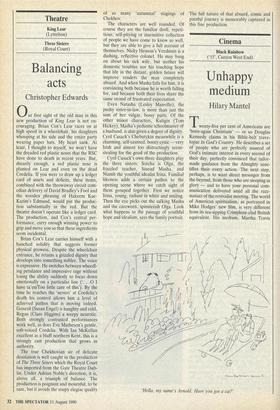Theatre
King Lear (Lyttelton) Three Sisters (Royal Court)
Balancing acts
Christopher Edwards
0 ur tirst sight of the old man in this new production of King Lear is not en- couraging. Brian Cox's Lear races on at high speed in a wheelchair, his daughters whooping at his side and the entire party wearing paper hats. My heart sank. At least, I thought to myself, we won't have the dreaded red plastic noses that the RSC have done to death in recent years. But, drearily enough, a red plastic nose is planted on Lear and even on the dead Cordelia. If you were to draw up a ledger card of assets and deficits, these items, combined with the throwaway circuit com- edian delivery of David Bradley's Fool and the wooden phrasing of Hakeem Kae- Kazim's Edmund, would put the produc- tion substantially in the red. But the theatre doesn't operate like a ledger card. The production, and Cox's central per- formance, carry enough winning power to grip and move you so that these ingredients seem incidental.
Brian Cox's Lear carries himself with a hunched solidity that suggests former physical prowess. Despite the wheelchair entrance, he retains a grizzled dignity that develops into something nobler. The voice is expressive. He switches between wheedl- ing petulance and impressive rage without losing the ability suddenly to focus down emotionally on a particular line (`. . .0 I have ta'en/Too little care of this'). By the time he reaches the `nevers' at Cordelia's death his control allows him a level of achieved pathos that is moving indeed. Goneril (Susan Engel) is haughty and cold, Regan (Clare Higgins) a weepy neurotic.
Both strongly contrasted performances work well, as does Eve Matheson's gentle, soft-voiced Cordelia. With Ian McKellan excellent as a bluff northern Kent, this is a strongly cast production that grows in authority.
The true Chekhovian air of delicate desolation is well caught in the production
of The Three Sisters which the Royal Court
has imported from the Gate Theatre Dub- lin. Under Adrian Noble's direction, it is, above all, a triumph of balance. The production is poignant and mournful, to be sure, but it avoids the soupy elegiac quality of so many 'autumnal' stagings of Chekhov.
The characters are well rounded. Of course they are the familiar droll, repeti- tious, self-pitying or insensitive collection of people we have come to know so well, but they are able to give a full account of themselves. Nicky Henson's Vershinin is a dashing, reflective colonel. He may bang on about his sick wife, but neither his domestic troubles nor his touching hope that life in the distant, golden future will improve renders the man completely absurd. And when Masha falls for him, it is convincing both because he is worth falling for, and because both their lives share the same strand of frustrated expectation.
Even Natasha (Lesley Manville), the pushy sister-in-law, is more than just the sum of her vulgar, bossy parts. Of the other minor characters, Kuligin (Tom Hickey), Masha's pedantic schoolmaster of a husband, is also given a degree of dignity. Cyril Cusack's Chebutykin meanwhile is a charming, self-centred, boozy cynic — very Irish and almost too distractingly scene- stealing for the good of the production.
Cyril Cusack's own three daughters play the three sisters: Sorcha is Olga, the frazzled teacher, Sinead Masha, and Niamh the youthful idealist Irina. Familial likeness adds a certain pathos to the opening scene where we catch sight of them grouped together. First we notice Irina, young, radiant in white and smiling. Then the eye picks out the sulking Masha and the careworn, spinsterish Olga. Look what happens to the passage of youthful hope and idealism, says the family portrait.
'Hello, my name's Arnold. Have you got a cat?' The full nature of that absurd, comic and painful journey is memorably captured in this fine production.










































 Previous page
Previous page